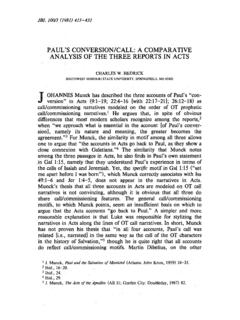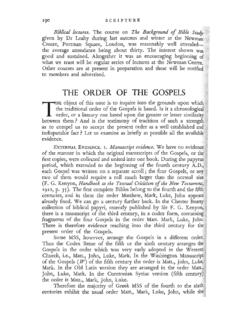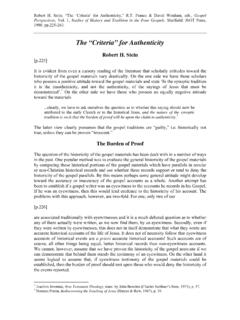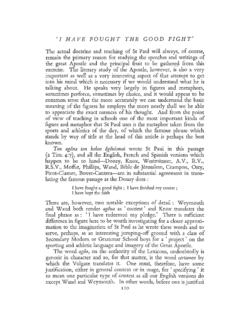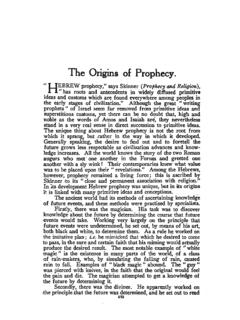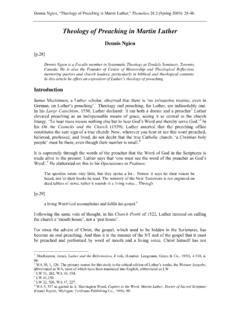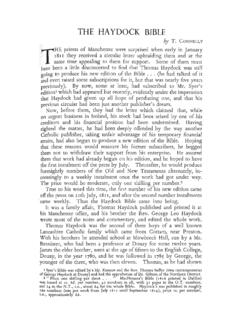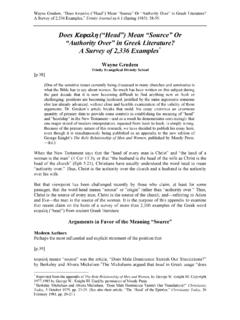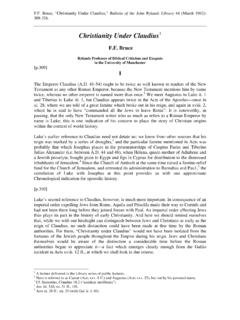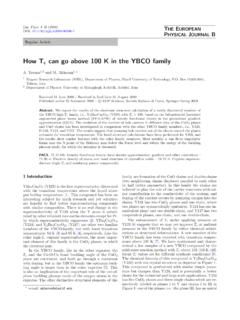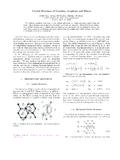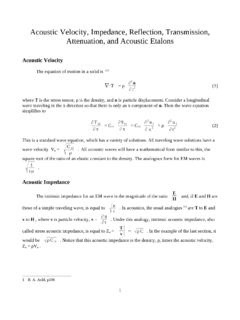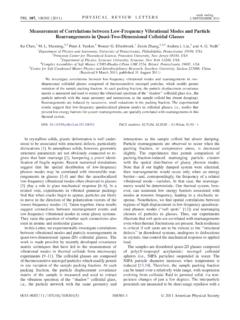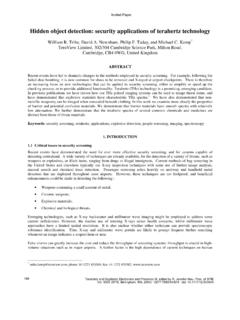Transcription of BARABBAS WAS A ROBBER - biblicalstudies.org.uk
1 St Edmund's Ware ' BARABBAS WAS A ROBBER ' Teachers of Sacred Scripture, as of other subjects, often feel the need to introduce into their lectures both the occasional lighter touch that is necessary in all teaching, and that incentive to personal investigation of the Sacred Text itself that is the ultimate aim of all Scripture teaching. One of the ways in which they might do this is the demonstration in actual working-out of the meaning of a term or phrase occurring in Sacred Scripture, which is at once not serious enough to matter very much anyway and yet sufficiently topical, or whatever it may be, to arouse and hold the interest of the student.
2 It is suggested that the following notes may serve as an example of what can be done in this line of ' detection' by both teacher and pupil without much more equipment than a very rudimentary knowledge of the Greek language and access to a few good dictionaries and commentaries. New Testament experts-for whom this is not written -will, of course, recognise the source of the impulse to undertake this particular piece of detective work in Pick!' s The Messias, and suspect the present urge to put it in print as originating in the notes of the new translation of the New Testament into English published by the Jesuit Father Kleist and my own confd:re Father Joseph Lilly in America.
3 Who was BARABBAS ? At least the average clerical student, and perhaps even the educated Catholic layman, hearing this question, will at once remember the Chronista singing Erat autem BARABBAS latro in the Passion on Good Friday, call on the remnants of a classical schooling, add the resources of Cabrol and his Holy Week Book, and answer triumphantly that St John says' BARABBAS was a ROBBER ' and that settles that! But did he? And does it? St John, after all, did not write in the Latin of the Missale Romanum or in the English of Cabrol's Holy Week Book.
4 What he actually said was en de ho BARABBAS lestes, and the real question is: does that mean IIS BARABBAS WAS A ROBBER , now BARABBAS was a ROBBER '? And that is a point that might be very much disputed. The first step in the solution of this little problem is, obviously, to blow the dust off our old friend Liddell and Scott and see what, accord-ing to it, is the meaning of lestes. There we find that' ROBBER ' and 'robbery' do indeed figure among the meanings, and the primary meanings, of lestes. But we find also' plunderer, pirate, buccaneer,' and these are by no means all the same thing.
5 We find that Thucydides 'notes that there was in early times no disgrace in the occupation' of lestes. And we fmd Liddell and Scott both reminded of Shake-speare's phTase ' convey the wise it call' -and we still wonder what we should 'it call.' We have a vague feeling, for instance, that even the one word ' pirate' applied to Sir Francis Drake meant altogether different things according as the speaker was Queen Elizabeth or Philip II of Spain. But we find-our first clue ?-that it is also used of ' irregular troops,' as was the Latin latro.
6 Souter's Pocket Lexicon gives us two more words to add to our growing list, ' . a brigand, a bandit.' We don't really get much help from Moulton and Milligan's Vocabulary, but we do note in passing that lestopiastes is ' an officer detailed for special service in the search for certain criminals' (my italics) in a third-century papyrus, and that a late second-century papyrus uses lestarchos, an ' arch-pirate,' metaphorically. And we are still wondering what St John had in mind when he said en de ho BARABBAS lestes !
7 We now recall the great rule of interpretation: that Scripture is mostly its own best interpreter. Does St John use the term anywhere else ? We look at our Greek Concordance and we find that he also uses it in 10:1, where he makes Our Lord say of the man who gets into the fold by the back door: kleptes esti kai lestes. Liddell and Scott had suggested a certain antithesis in the two words so they can't mean quite the same thing, and the fact that kleptes is the one that has come down in English makes us wonder whether that is not the more reprehensible one; or is it just the question of physical force?
8 He uses it also in verse 8 of the same chapter, in the plural, but in exactly the same context, so that does not help us very much. St Paul (2 Cor. II :26) was' in peril from lestai,' but that does not tell us much either, except since they were people he expected to meet on his journeyings they yrere either' pirates' or, perhaps, 'highwaymen,' as far as there being a danger to him was concerned. In Matt. 21:13 we find the Temple's being made spelaion leston 1_' a brigands' cave' is probably the meaning of the original and of the LXX.
9 Only when 1 'Brigands,' , highwaymen,' tot/t cot/rt, are only doubtfully in context in Luke 10, in the story of the Good Samaritan. II6 , , BARABBAS WAS A ROBBER we turn to the Synoptists on the Passion do we really begin to get some help-and that, after all, is more directly relevant to the interpretation of the phrase in St John. Matt. 26:55 and the parallels, Mark 14:48 and Luke 22:52, all render the words of Our Lord to the heavily armed party that came out to apprehend him as: ' You are come out, hos epi lesten, with swords and clubs, to arrest me.
10 ' Would such a show of force be necessary for the apprehension of a mere ' ROBBER '? And was it, perhaps, some nuance in the (presumably Aramaic) words of Our Lord that caused the immediate flight of the disciples that the display of force alone did not suffice to bring about? Can we find anything more direct in the Synoptists ? We remember then the miserable attempt of Pi late to set Our Lord free, and we find St Matthew saying of BARABBAS , in our Douay version, that he was' a notorious prisoner,' desmion episemol1 (26:r6).
